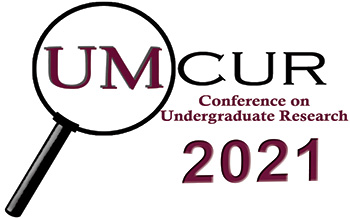Project Type
Presentation
Faculty Mentor’s Full Name
Laurie Minns
Faculty Mentor’s Department
Division of Biological Sciences
Abstract / Artist's Statement
COVID-19 Team Based Learning In Cellular and Molecular Biology Enhances Student Engagement and Enthusiasm In Learning
Student perceptions of learning outcomes in team-based learning (TBL) situations were explored in the summer offering of BIOB 260: Cellular and Molecular Biology at the University of Montana. The TBL methods employed in this course were three active participation small group exercises with pre- and post-activity assignments and a final group project. This study looks to test how TBL is received by students and if these activities would lead to an increase in students’ perception of learning. To better understand team-based learning in Cell and Molecular Biology, pre- and post- course Student Assessment of Learning Gains (SALG) surveys were analyzed. This study was reviewed by the University of Montana Institutional Review Board (#186-19) and given exempt status. Only results from students who consented to FERPA were included. The students’ perception of active learning was studied as well as learning gains on COVID-19 topics such as origin and pathogenesis. Student qualitative responses were gathered from Likert scale surveys and tracked from the beginning to end of the course. The student’s quantitative responses were analyzed in which keywords were extracted indicating high, middle, and low self-confidence of their knowledge. From the analysis of the data, a positive correlation is shown between perceived learning gains and group activities. Students indicate a gain in their understanding of the central dogma and describe an overall increase in knowledge integration; connecting information from this course to courses they have taken in the past. Additionally, keywords associated with excitement, understanding, and knowledge were recorded at a much higher frequency in the post- course survey. This research is important for science courses as the transition from a standard lecture format to one of peer communication and interaction is increasingly favored in the higher education setting.
Category
Life Sciences
COVID-19 Team Based Learning In Cellular and Molecular Biology Enhances Student Engagement and Enthusiasm In Learning
COVID-19 Team Based Learning In Cellular and Molecular Biology Enhances Student Engagement and Enthusiasm In Learning
Student perceptions of learning outcomes in team-based learning (TBL) situations were explored in the summer offering of BIOB 260: Cellular and Molecular Biology at the University of Montana. The TBL methods employed in this course were three active participation small group exercises with pre- and post-activity assignments and a final group project. This study looks to test how TBL is received by students and if these activities would lead to an increase in students’ perception of learning. To better understand team-based learning in Cell and Molecular Biology, pre- and post- course Student Assessment of Learning Gains (SALG) surveys were analyzed. This study was reviewed by the University of Montana Institutional Review Board (#186-19) and given exempt status. Only results from students who consented to FERPA were included. The students’ perception of active learning was studied as well as learning gains on COVID-19 topics such as origin and pathogenesis. Student qualitative responses were gathered from Likert scale surveys and tracked from the beginning to end of the course. The student’s quantitative responses were analyzed in which keywords were extracted indicating high, middle, and low self-confidence of their knowledge. From the analysis of the data, a positive correlation is shown between perceived learning gains and group activities. Students indicate a gain in their understanding of the central dogma and describe an overall increase in knowledge integration; connecting information from this course to courses they have taken in the past. Additionally, keywords associated with excitement, understanding, and knowledge were recorded at a much higher frequency in the post- course survey. This research is important for science courses as the transition from a standard lecture format to one of peer communication and interaction is increasingly favored in the higher education setting.
